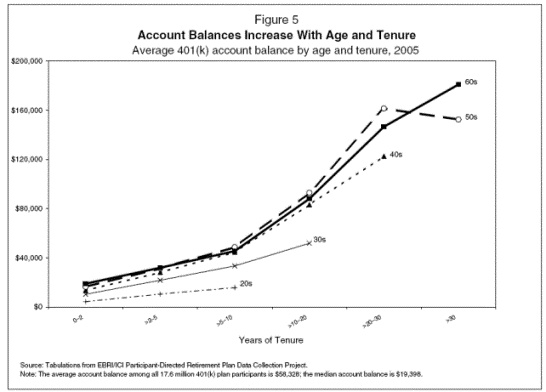Some highlights from this document (relating to period ending 12/2005):
- Average account balance (12/2005) - $102,014
- Median account balance (12/2005) - $54,591
- Account balances by age group -
- 20's - $24,16930's - $50,93040's - $91,84850's - $127,766
- 60's - $140,957
Note that these account balances are not averages for the entire age group, they are only averages for those members of the age group that actually have a 401k investment. So, if you average the numbers across an entire age group, including those individuals that do not participate in any retirement plan, the numbers will be lower.
The document itself notes that the averages provided are misleading since 401k account balances are strongly skewed by an employee's tenure with his current employer. If you take me for example, although I have maxed out my 401k contributions every year, my 401k balance is far below the average stated above for my age group, since I have only been with my company for two years.
I am also struck by the fact that balances do not seem to be climbing dramatically as people approach retirement. I am guessing that once again this is a factor of tenure, as the following figure seems to suggest.

Assets in 401k plans are allocated as follows:
- Equity Funds: 48%
- Company Stock: 13%
- Balanced Funds: 11%
- Bond Funds: 10%
- Stable Value Funds: 13%
- Money Funds: 4%
As you would expect, investment in equities decreases with age - from 51.9% for participants in their 20's, to 37.8% for participants in their 60's.
Why people in their 20's would be this conservative with their retirement investments is beyond me. With such a long time horizon I would expect much more aggressive investments. My hunch is that this conservatism is a sign of lack of education and fear of investing, and not a conscious decision.
This is interesting data and I will explore it in more detail in future posts. It will also be interesting to note how this data changes for 2006. A new report that covers that period will probably come out in a couple of months.
1 comment:
I also wonder to what degree this data is skewed by people like me. I worked in the private sector for a while, but now work for a state university. I participated with my previous employer's 401-K. The state provides a state retirement plan which is a pension. I am starting to supplement that with a 403-B, but it still makes my numbers look funny since most of my retirement funds over the last decade have been contributions to my pension fund and not a 401-K.
Post a Comment